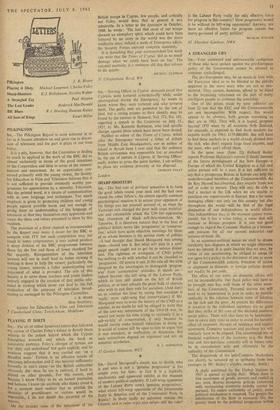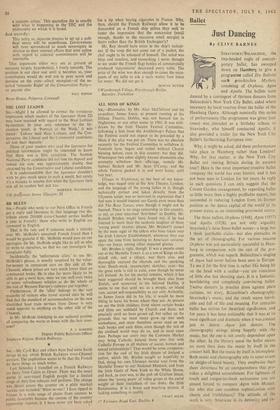A STRANGLED CRY S1R,—Your continued and unreasonable castigation of those
who have spoken against the pro-European policy of the Government cannot be allowed to continue unchallenged.
The pro-Europeans may be so much in love with the European ideal as to be blinded to the pitfalls apparent to the more wary who are not so ena- moured. They cannot, however, afford to be blind to the increasing reluctance on the part of many intelligent people to continue the courtship. One of the points made by your editorial on June 22 was that the EEC and the Commonwealth arc not incompatible. With respect, this would appear to be obvious, both groups remaining as they are in 1962. They will, it is hoped, progress beyond 1970 when by all accounts Netv Zealand, for example, is expected to find fresh markets for exports worth (in 1961) £159,000,000. She will have to find these markets in a world already divided into the rich, who don't require large food imports, and the poor, who can't afford them.
In the same issue (June 22) Richard Bailey reports Professor Hallstein's correct (I think) forecast of the future development of the New Europe—a Europe of which the United Kingdom as a full and active partner will be a part. It is not sufficient to say that a prosperous Britain in Europe can help the underdeveloped members of the Commonwealth. As Sir Roy Harrod has observed, they require 'trade not aid' in order to mature. They will only be able to find a market in the UK when we are unable to purchase our requirements in Europe. But a far more damaging effect—not only on this country but also throughout the world—will be that of the legal diminution of our independence in world affairs. -1 his independence may at the moment appear trans- parent, but it has a value today, a value that will increase as Britain prospers. It is just not good enough to regard the Common Market as a heaven- sent panacea for all our current industrial and balance-of-trade ills.
In an economo-political union we shall be drawn inevitably into disputes in which we might otherwise have no interest. It is quite feasible that we may, by virtue of our membership, be obliged to adopt (if not agree to) a policy to the detriment of one or more of the Commonwealth nations. Freedom of action or alignment in domestic or foreign policies should not readily be put aside.
The effect of our entry on domestic affairs will not be inconsiderable. Our fiscal policy will have to be brought into line with those of the other mem- bers of the Community. Personal income tax will need to be harmonised in part in order to provide similarity in the relation between rates of taxation on the rich and the poor. At present the differences in taxation in the individual members are so great that they strike at the core of the declared common social policy. There will also have to be harmonisa- tion in estate duty rates in order to avoid the harmful effect of excessive changes of residence and capital movement. Company taxation and purchase tax will similarly have to be aligned. The unrestricted use of financial regulators of the economy (e.g. the Bank rate and hire-purchase controls) will in future only be in consultation with and ultimately by the authority of the Commission.
The disquietude of the anti-Common Marketeers can shortly be summed up as springing from two passages in Mr. Bailey's articles, namely, firstly : A study published by the United Nations in 1947 is quoted as saying that: 'When there is free movement of goods, persons and capital in any area, diverse economic policies concerned with maintaining economic activity cannot be pursued. To assure uniformity of policy, some political mechanism is required. The greater the interference of the State in economic life, the greater must be the political integration within
a customs union.' This quotation fits in exactly with what is happening in the EEC and the philosophy on which it is based.
And secondly : This being so, separate treaties to set up a poli- tical union will be superfluous. Governments will have surrendered so much sovereignty in relation to their internal affairs that joint action with regard to external commitments will be inevitable.
That arguments either way are at present of necessity largely hypothetical, I freely concede. The position is not clear and until it becomes so, your contributors would do well not to pour scorn and derision on the cries—albeit strangled—of the so- called `romantic Right' of the Conservative Party— or anyone else.
PAUL RIPPON
Brent House, Polperro, Cornwall











































 Previous page
Previous page